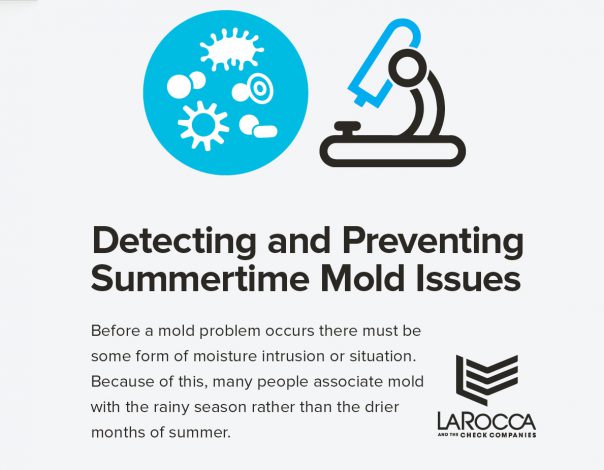Detecting and Preventing Summertime Mold Issues

Mold issues can affect the health of your client, family, and also the value of the home whether buying or selling. In the real estate industry, mold issues are thought by many to be a factor that may hurt a deal. Due to that fact, some agents are hesitant to recommend a mold inspection, the neglect of which can expose them to possible litigation after escrow closes.
Before a mold problem occurs there must be some form of moisture intrusion or situation. Because of this, many people associate mold with the rainy season rather than the summer. However, due to the elevated amount of humidity and the raised amount of landscaping watering, there are many issues that are specific to the summer months. Here are a few tips that are designed to help you detect and prevent summertime mold issues:
- In the summer, the lawn sprinklers and watering hoses are in use more often. Overwatering your lawn or plants along the outside of the home’s foundation may create moisture intrusion that can contribute to mold problems. Position the sprinklers to spray away from the house so that they water the landscaping and not the house, garage or other structures. The sprinklers should not be constantly watering the siding, windows, or foundation walls of the home as this can lead to moisture intrusion.
- It’s best to keep trees, shrubs and plants trimmed back away from the house to allow airflow between the trees and shrubs and the home, helping to keep the walls of the building dry.
- The constant running of air conditioning systems during the hotter months can raise moisture levels (humidity) inside a building. Also, the areas around and under an air conditioning system can be a source of moisture due to the condensation created by the difference in the temperature between the cooling system and the heat of the house. If you see water dripping from a plastic pipe positioned on the exterior wall, usually above a window or door, it’s likely because the primary drain line is clogged and in need of cleaning or adjusting. Air conditioning systems along with their condensate pipes and the condensate pan should be professionally checked regularly to ensure that they are clean and working properly.
- According to the Environmental Protection Agency (EPA): “If you suspect that the heating/ventilation/air conditioning (HVAC) system may be contaminated with mold (it is part of an unidentified moisture problem, for instance, or there is mold near the intake to the system), consult EPA’s guide Should You Have the Air Ducts in Your Home Cleaned? before taking further action. Do not run the HVAC system if you know or suspect that it is contaminated with mold – it could spread mold throughout the building.” ” You can visit www.epa.gov/iaq/pubs/airduct.html or call (800) 438- 4318 for a free copy.
- In some areas, such as near the ocean, high humidity levels are common. Keeping humidity levels between 30 & 60 percent inside the house will go a long way in solving or preventing mold problems. Use air conditioners and dehumidifiers as necessary and run exhaust fans when you are showering, cooking or dishwashing. Problems in the closet areas can become more common with high humidity levels so you may want to check the closets regularly if your home seems humid and it’s a good idea to not store items close to walls.
If you are concerned that a home you are selling or buying may have a mold or moisture problem, have a professional mold inspector perform a thorough evaluation of the home. To ensure that you get an honest opinion it’s a good idea to hire an inspector who does not do any repairs or remediation to mold problems and has no reason to hype up a small situation into a bigger situation.
By Chris Griffin, President – LaRocca Inspections and the Check Companies 818-951-1795

